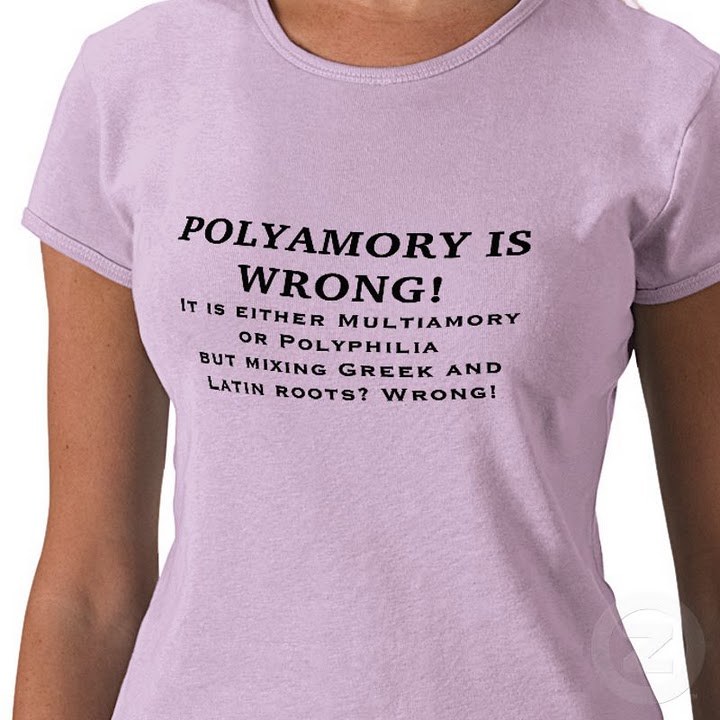by Jason Stotts
I saw this come across the twitter earlier today (via @kellyelmore79) and several people were kind enough to forward it to me as well. I think it’s one of the best things I’ve seen in awhile.
I share this etymological worry myself. As I said in “On Polysexuality“:
What I am interested in analyzing is the practice of having multiple sexual partners. […] I will begin by naming it “polysexuality” combining the Greek poly- (more, many) with the Latin sexus (sex) and meaning by it the condition of having multiple, or more than one, sexual partners during any one time period (not necessarily simultaneously) or of having sex with people besides a person’s partner while he is in a relationship. As much as I hate to combine Greek and Latin, the standard nomenclature regarding sexuality has already been bastardized and, so, for clarity’s sake in English, I will follow suit. The problem is that there is no sufficient word in the English language to deal with the phenomenon that we are analyzing and so I must introduce this new word to carry the cognitive weight of the following analysis. Furthermore, in contrast to “polysexual,” I will introduce the word “monosexual,” the Greek mono- (one), as meaning sex with only one person during any time period or, to put it another way, a person who does not have sex with anyone besides his partner when he is in a relationship.
Unfortunately, English is lacking in some pretty important words regarding love and sexuality.
Furthermore, the word “poly-philia” (from the shirt) more properly means that one has a lot of friends than it means something like multiple lovers. The greek philia is the love of a friend, not the romantic concept of love that we have in our culture and which is absent from Greek culture.
Ultimately, I think that in these matters we are either going to have to bite the etymological bullet and accept the bastardized words or have issues being understood.

Comments
3 responses to “Polyamory is Wrong!”
To play devil’s advocate…
Why does it matter if a word combines Latin and Greek roots? Isn’t this how linguistic morphology works all the time? What is the English language if not a crazy combination of Old German (Anglo-Saxon) with Old French (Old Norman)? Take the word “burial” for instance. While it comes from the Middle English “biriel,” by the 15th Century it was combined with the French ending “-al” (as in words like “espousal,” “filial”). If we know what the word means, then what does it matter? It would be one thing if we were trying to communicate via Greek or Latin to someone else, but we’re not. We’re communicating in English, using bits and pieces of words borrowed from other languages (which were formed via the same process). Besides, the word “polyamory” is etymologically closer to a combination of Greek and French: poly + amour = polyamoury (the 19th C spelling of the word). Sure, French is a Romance language with Latin being its primary basis, but I don’t think that changes my point.
References: Oxford English Dictionary, c.v. “burial,” “polyamory.”
Oh T. Scott…I have no argument to advance against you, except that it makes every etymological nerve in my body cringe and recoil. I find it similar to spanglish or franglais, it just hurts me to hear it.
I ultimately ended up forming “polysexuality” as a mis-mash in order to follow precedence and make it intelligible. I cannot deny that these etymological bastards make sense and that we can understand them, but I resist “ain’t” for similar reasons: even though I know what it means, I worry about the health of the language.
Ultimately, I, perhaps, must admit defeat on this point. However, don’t think that this means I won’t still cringe when I hear certain words.
~Jason
When feelings trump arguments… Just kidding.